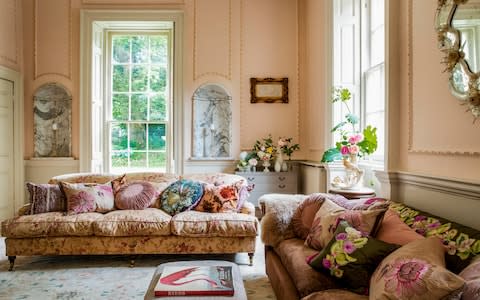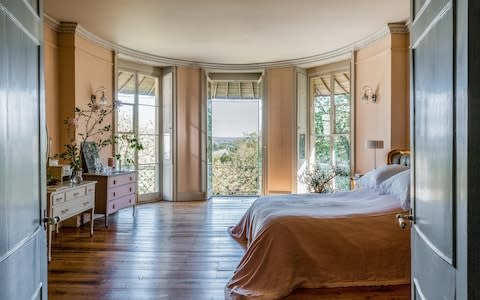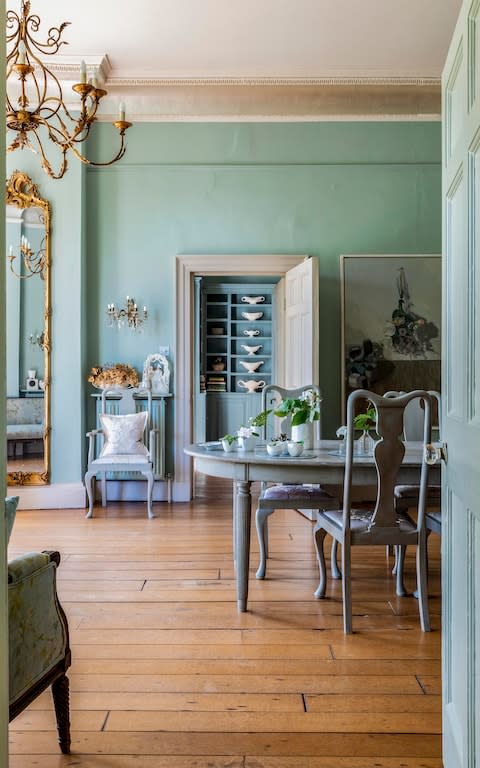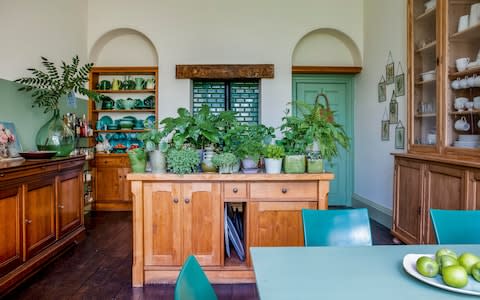From suffragette hideout to hippie commune: inside a fixer-upper castle in Bath

Surrounded by landscaped gardens and ancient woodland, it’s hard to believe that Batheaston Villa lies less than two miles from the centre of Bath.
Tucked away down along, winding driveway, this hidden architectural treasure is the result of one woman’s remarkable vision, as the current owner, Meryl Lakin, discovered when she and her husband John bought the property three years ago.
It was built in the mid-18th century by Lady Anna Riggs Miller, who had spent several years travelling around Italy.
She fell in love with the country’ s rich culture and classical aesthetic and wrote a bestselling guide to the Grand Tour – so it’s perhaps unsurprising that this Georgian house has a strong Italianate influence. The studded front door feels more like the entrance to a grand palazzo than an English house, as does the curving, castellated rooftop.
The interiors are equally romantic , with exquisitely mirrored window shutters and candle-niches hewn from Carrara marble in the drawing room. 'The house has such a female quality that I like to think Lady Miller was quite involved in its design,' says Lakin.

Lady Miller also introduced weekly poetry salons at the villa, which proved so popular that they attracted Horace Walpole, known both for writing the first Gothic novel and building Strawberry Hill House in Twickenham.
Walpole appeared to be rather underwhelmed by Batheaston, calling it a ‘diminutive principality’, and advised his hostess to build a temple and a cascade in the gardens to add interest. She promptly took action, and today both features remain in the grounds.
'When we arrived, the Temple of Apollo was on the brink of becoming a picturesque ruin,' says Lakin. 'One of the first things we did was to set about restoring it – it’s now a monument to 21st-century craftsmanship.'
Luckily, the main house was in a good state of repair – the previous owners had rescued it from near dereliction and had rendered it structurally sound.

Having worked for the homeware company Designers Guild for 25 years, Lakin has a well-honed eye for what makes a beautiful interior, so she set about redecorating it with confidence, giving the rooms a contemporary freshness. "The house has a fairy-tale atmosphere, so I wanted to bring a feeling of prettiness back to it," she says.
The dark hall was the first area to be transformed, painted in a soft bluish-grey called Pearl Colour, from Little Greene, while many shades of blush were tested in the drawing room before she settled on Farrow & Ball’s Pink Ground, a soft base shade that marries well with the gold wax that picks out the details on the elaborate plaster work.
Most of the couple’s furniture had been amassed from years of living in Victorian properties and spans from the early 19th to the late 20th century.
They didn’t feel the need to replace these pieces, but the one item they bought specifically for the villa was a Gustavian oval dining table.

It complements the curved bow window of the dining room and has four removable panels, enabling it to seat up to 24 people.
The interiors feel airy, almost minimal, as there are no curtains or carpets, so the original shutters and wide Georgian floorboards can to be seen to their best advantage. Yet the house never feels spartan, as Lakin has a soft spot for cushions and has bought many from Kirsten Hecktermann, who hand-dyes velvets and linens in subtle tonal palettes.
Lakin and her husband were previously based in London, but both have gradually adapted to Bath’s slower pace of life. 'It has worked its magic on us,' she says.
'At first I thought I would travel back and forth to London a lot more, but I’ve fully embraced living here. If you make the jump and move, there’s no point in trying to recreate your previous life – you need to throw yourself into the new one.'
Part of her time has been spent in doing more research on the villa’s former occupants: in the 1960s and 1970s, it was used as a commune, and had its own resident swami (a Hindu religious teacher).

Earlier still, the building was a hub for the suffragette movement during the Edwardian era, when it was owned by two spinster sisters called Aethel and Grace Tollemache, who ran it as a refuge for women activists recently released from prison.
'They were strident feminists – very keen on digging up golf courses and pouring paint through letter boxes in protest,' says Lakin. The sisters spent their entire lives at Batheaston.
For centuries, this unusual house has acted as a place of inspiration and conviviality, and fortunately the current owners are determined to preserve and safeguard it for future generations. 'The job, of course, is never done,' says Lakin, 'but we consider it a privilege to work on and care for it, and hope that Lady Miller is smiling approvingly at our efforts.'
Sign up for the Telegraph Luxury newsletter for your weekly dose of exquisite taste and expert opinion.

